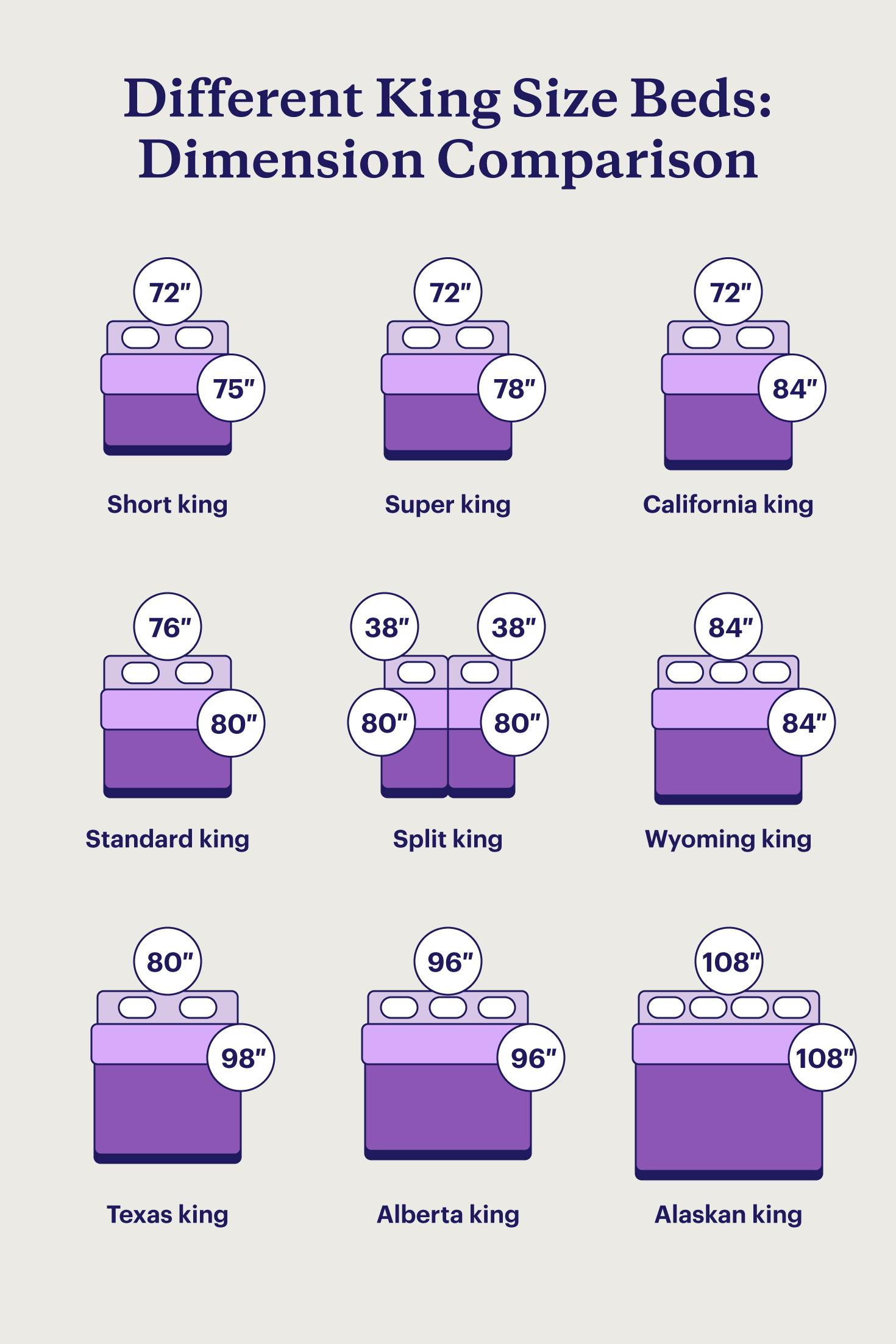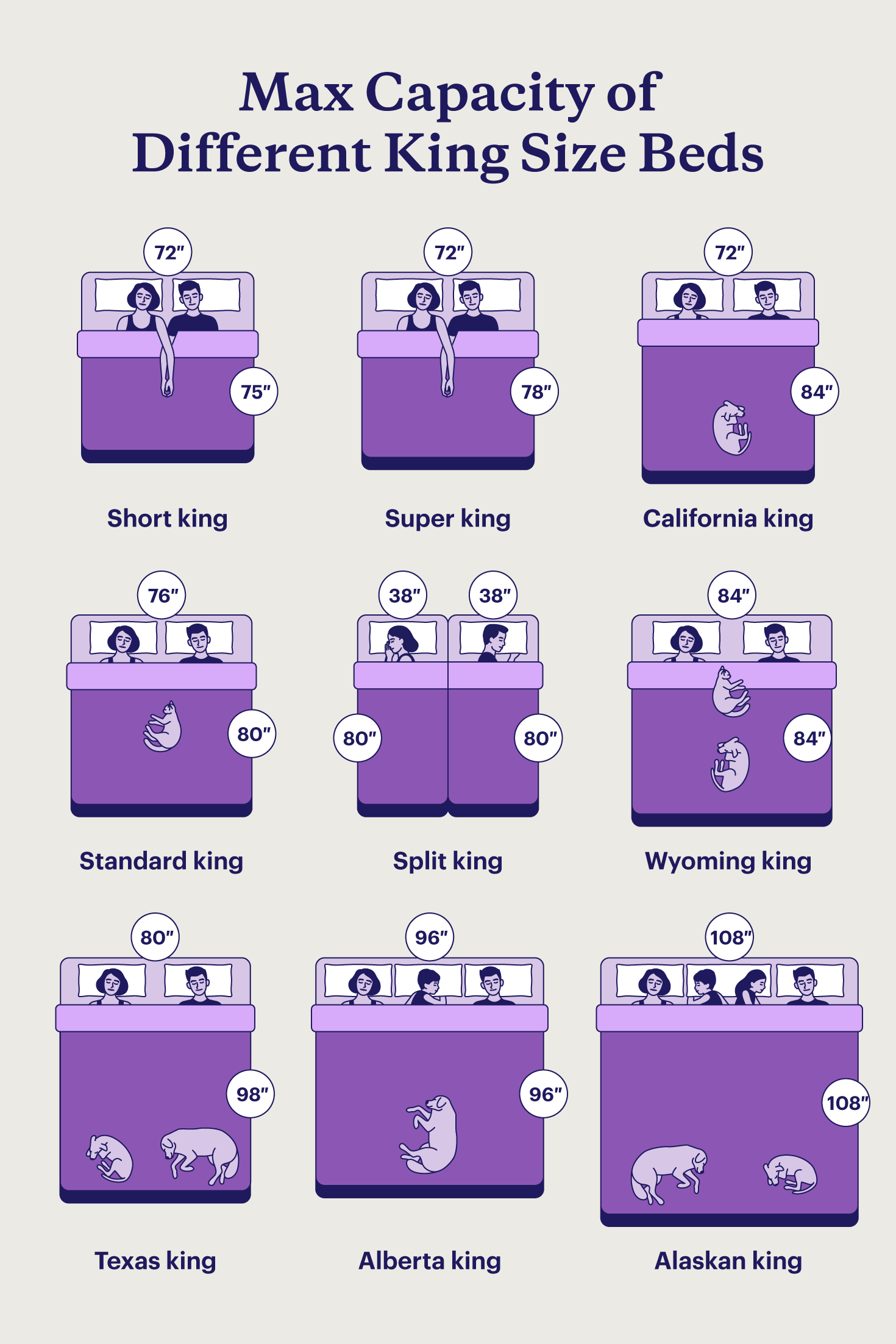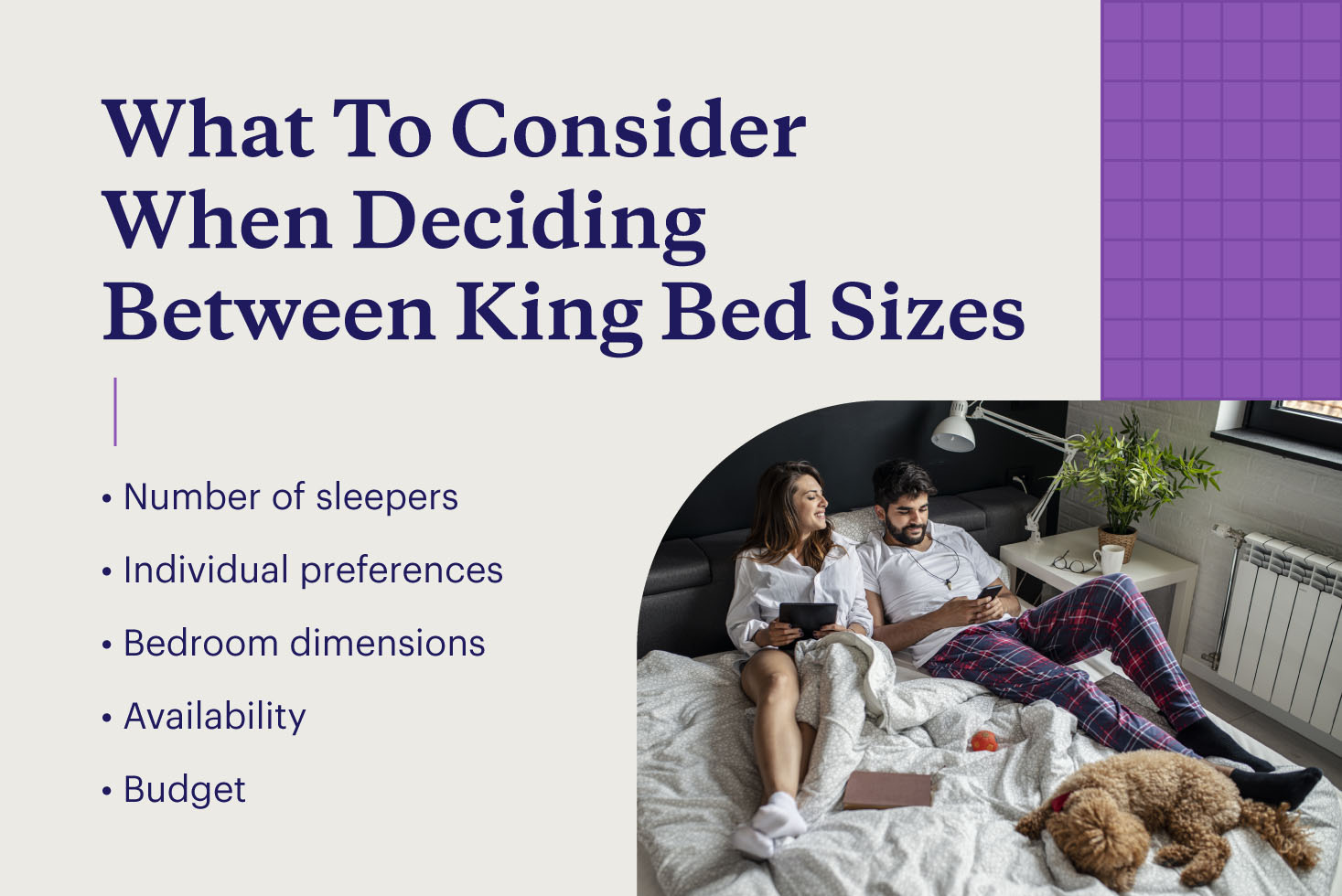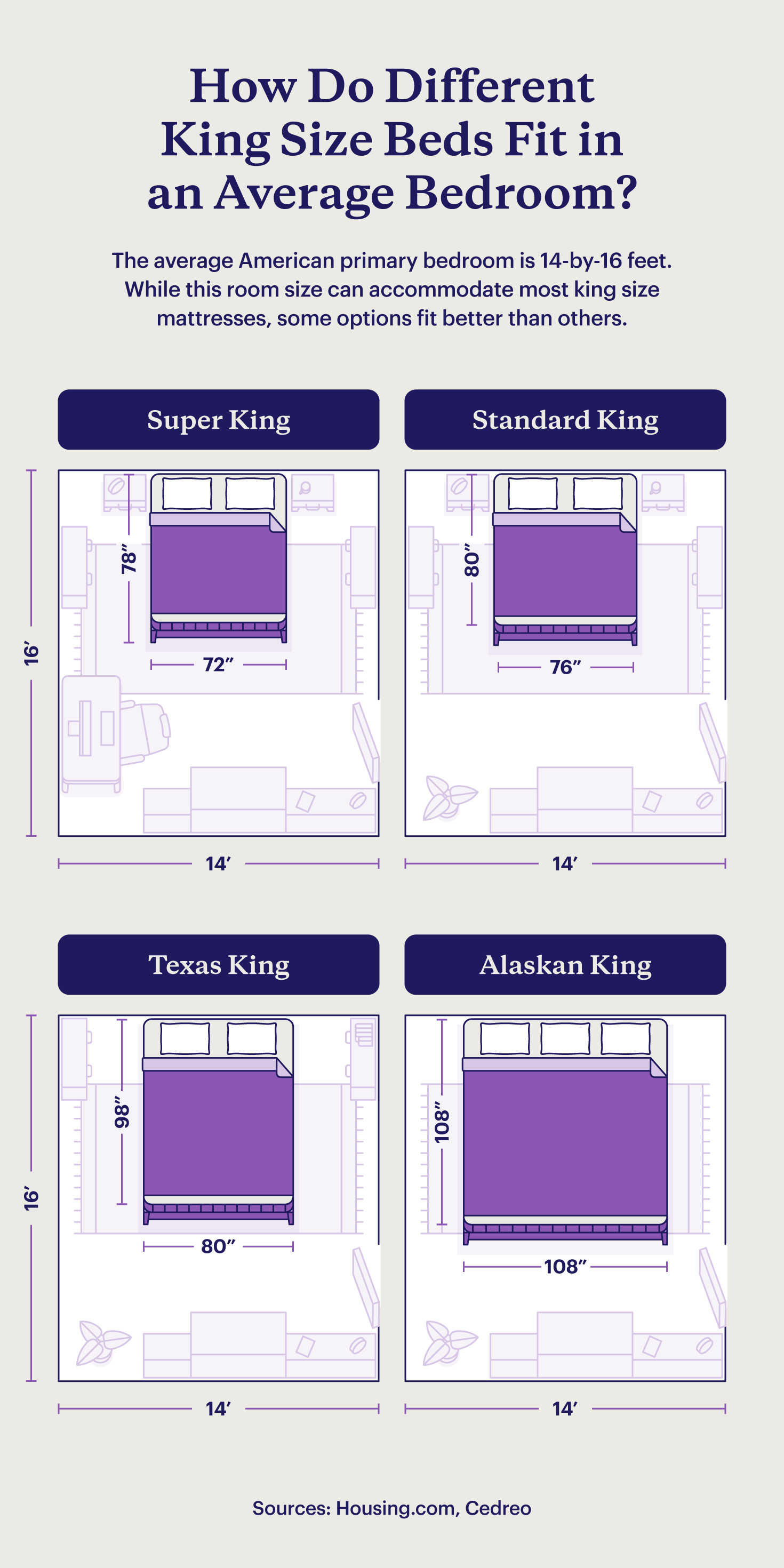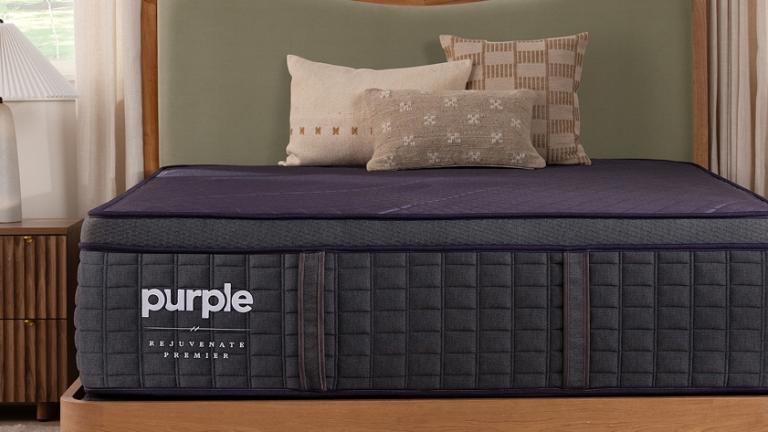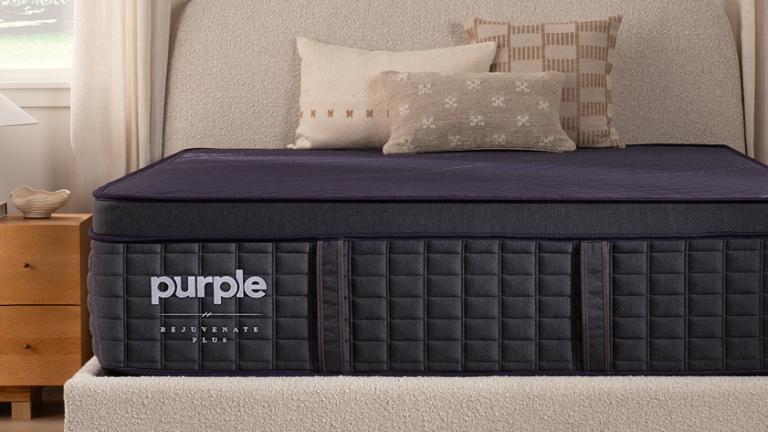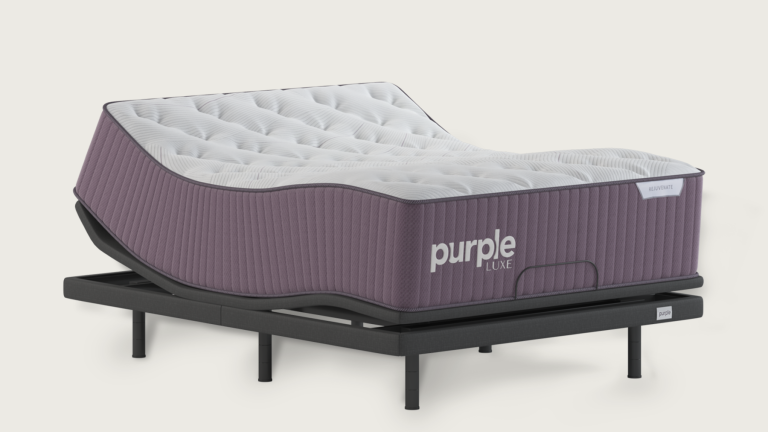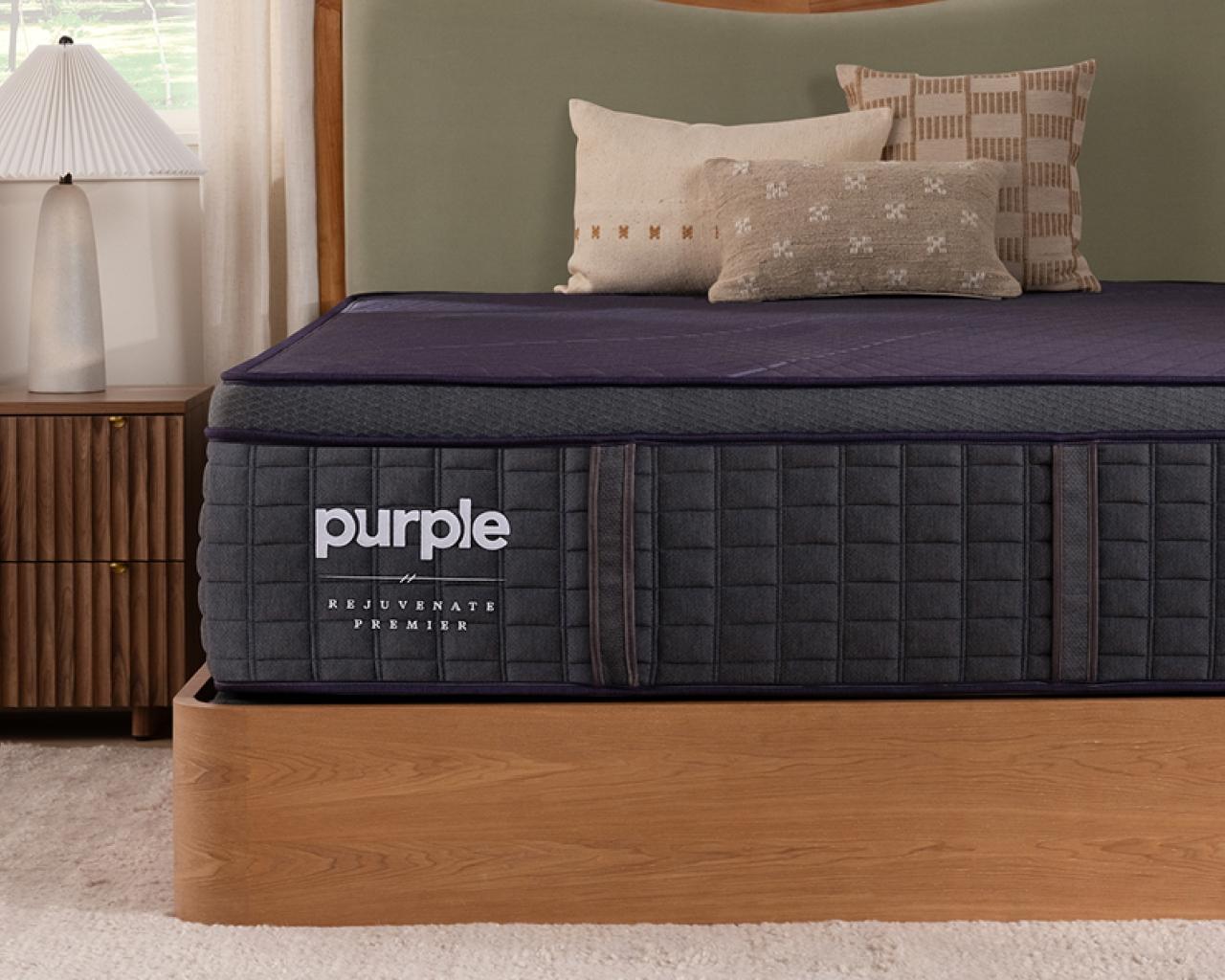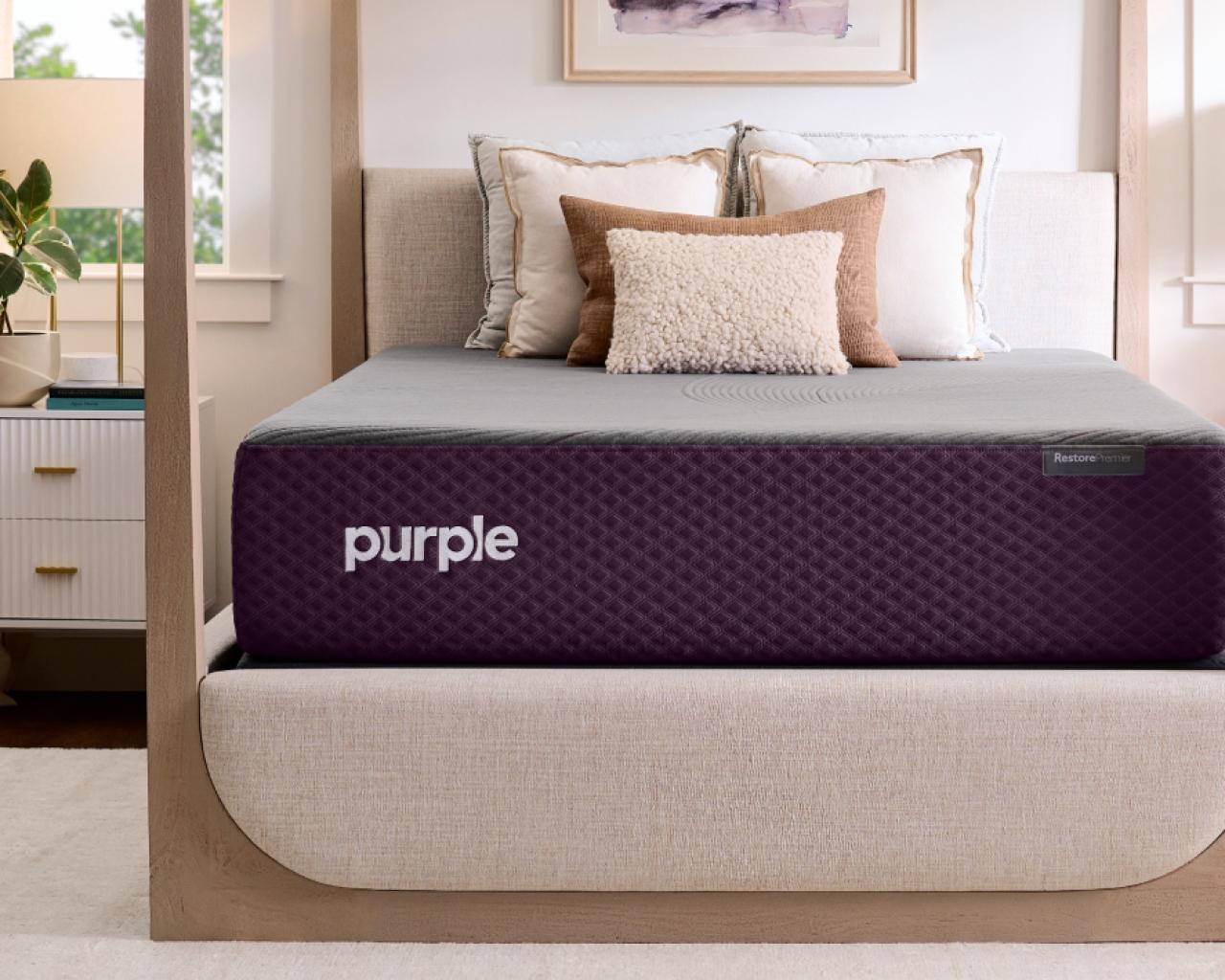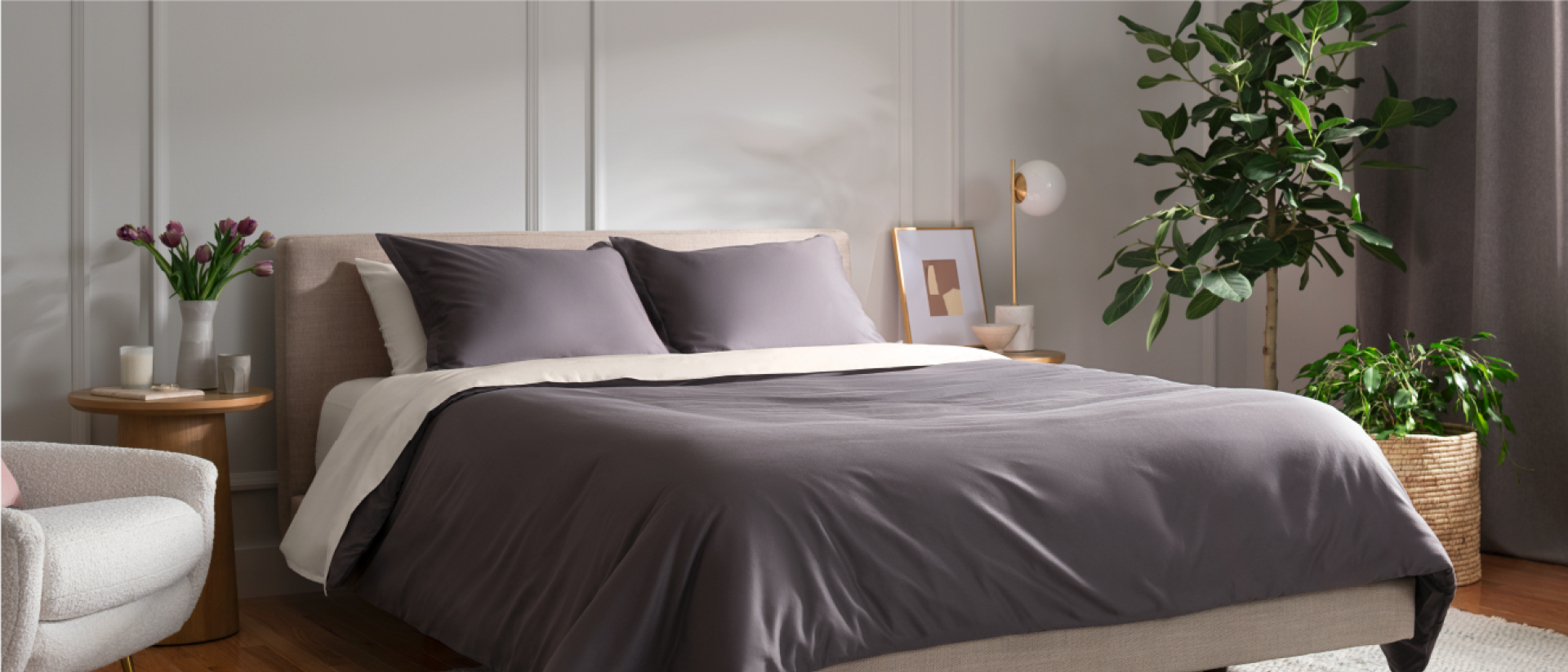
The 9 Different King Size Beds: Comparison Guide [+ Chart]
Key Takeaways
- There are nine different types of king size beds, from short king to Alaskan king.
- The most common king size beds are the standard king and California king.
- The different sizes of king beds vary, with the smallest king bed measuring 75-by-72 inches and the largest king bed measuring 108-by-108 inches.
Upgrading your mattress to a bigger size is typical for couples who want more personal space or plan to co-sleep with kids and pets. This makes king mattresses a popular choice within the standard mattress size spectrum.
Larger than queen beds, standard king beds are fairly common, but serve as one of many king bed sizes. There are nine different king size beds on the market, and they range in dimensions, availability, and cost.
While Purple doesn’t carry specialty mattresses, we offer mattresses in all standard sizes, including the standard king.
Read along to learn how the different size king mattresses compare and how to decide between these nine options.
1. Short King
Dimensions: 75-by-72 inches
Short king beds are primarily used as RV mattresses, measuring 5 inches shorter than a standard king to better fit in the cabin of an RV or camper. An RV mattress must be lighter and thinner than a standard mattress; a taller, heavier mattress may be challenging to maneuver and fit in an RV. If you’re searching for a mattress to fit in an RV, your options are limited.
A short king mattress maximizes the amount of space you have to sleep in small quarters. You can also consider the short queen mattress size, which is the same width as a queen but 5 inches shorter.
These specialty sizes are hard to find, so you may need to custom order a short mattress as well as accessories like bedding and bases.
Pros | Cons |
| Just as wide as a standard king | Not as long as a standard king |
| Fits better in an RV than a standard king | Fewer options for comfort features, materials, and feel |
| Uncommon specialty size may require a costly custom order |
Of the different types of king size beds, the short king is the smallest, sharing its width with the super king and California king sizes but several inches shorter than both.
Compare all nine different king size beds to inform your decision with the king size bed chart below.
Bed Size | Surface Area (in2) | Length (in) | Width (in) | Ideal Room Size (ft) |
Short King | 5,400 | 75 | 72 | 10-by-10 |
Super King | 5,616 | 78 | 72 | 11-by-10 |
California King | 6,048 | 84 | 72 | 14-by-12 |
Standard King | 6,080 | 80 | 76 | 12-by-12 |
Split King | 6,080 | 80 | 76 | 12-by-12 |
Wyoming King | 7,056 | 84 | 84 | 14-by-14 |
Texas King | 7,840 | 98 | 80 | 15-by-12 |
Alberta King | 9,216 | 96 | 96 | 15-by-15 |
Alaskan King | 11,664 | 108 | 108 | 16-by-16 |
2. Super King
Dimensions: 78-by-72 inches
While the name suggests larger dimensions, the super king falls between a standard king and short king. Longer than a short king but shorter than a standard king, super king beds offer plenty of space for most couples and may fit better in a primary bedroom measuring from 11-by-10 feet to 12-by-12 feet.
Couples who want more room than a queen but don’t have enough floor space to accommodate a king may consider a super king size bed. This mattress size may be harder to find and could require a custom order with limited options for customization. If you or your partner have strong preferences for firmness, feel, or material, you may have a hard time finding a super king bed that meets your needs.
Depending on how you and your partner sleep, a super king may not provide enough space for each individual, but it could also foster closeness.
Pros | Cons |
| Just as wide as a standard king | May not be ideal for individuals or couples over 6’4” |
| May fit better than standard kings in bedrooms between 11-by-10 feet and 12-by-12 feet | Limited options for materials, features, and feel |
| Non-standard size may require a custom order for mattress, bedding, and base |
3. California King
Dimensions: 84-by-72 inches
Compared to a standard king, California kings are longer and narrower, offering more leg room but less width to spread out. These beds are a popular choice for individuals and couples over 6’4” or those who want space at the foot of the bed for a pet.
Couples who want to upgrade their mattress for added space may consider a California king because it is larger in all dimensions than a queen. Choosing between a king and California king comes down to sleepers’ heights, co-sleeping arrangements, and personal preference.
Pros | Cons |
| Offers more space than a queen bed | Less width for each sleeper than a king bed |
| Suitable for sleepers under 6’4” | Not always available in a split option |
| Relatively easy to find bedding and bases | May not be ideal for sleepers over 6’4” |
| Bedding is not as widely available as other standard sizes |
4. Standard King
Dimensions: 80-by-76 inches
Also known as Eastern kings, king mattresses are the largest standard size mattresses on the market. Bigger than a queen, king mattresses offer more width than other standard sizes, making them popular among couples who want extra room.
King beds are far from the largest mattress available, but they are more common than bigger bed sizes. You’ll have an easier time finding mattresses, bed frames, and bedding in a standard king size.
Pros | Cons |
| Wider than other standard mattresses | Same length as a queen bed |
| Easy to find bedding and bed frames | Less space to co-sleep with kids and pets |
| Lower price point than larger specialty mattresses |
5. Split King
Dimensions: 80-by-76 inches
Split king and standard king mattresses have the same dimensions — the main difference between these sizes is the number of mattresses. Split kings are made of two mattresses pushed together, while a standard king mattress is a single mattress.
Split king beds feature two twin XLs, offering more customization for feel and firmness. Split California king sizes are also available, with two mattresses measuring 84-by-36 inches, though they aren’t as common as standard size mattresses.
Pros | Cons |
| More customization for couples with different sleep preferences | May create an uncomfortable gap in the middle of the bed |
| Option to use twin XL or king size sheets depending on personal preference | May not be ideal for couples who like to cuddle at night |
6. Wyoming King
Dimensions: 84-by-84 inches
The Wyoming king bed is not small, but it is the smallest oversized mattress on the market, measuring 8 inches wider than a standard king with the same length as a California king. Though they may have some dimensions in common, oversized mattresses like the Wyoming king are not compatible with standard or California king bases or bedding.
Couples who co-sleep with a child or pets may choose a Wyoming king for its extra length and width. Compared to other oversized mattresses, Wyoming king beds fit better in smaller bedrooms.
Pros | Cons |
| Longer and wider than a standard king | Limited availability except in specialty stores or by custom order |
| Wider than a California king | Harder to find bedding and accessories |
| Comfortable for individuals under 6’4” | Higher price point than smaller standard sizes |
| Great for couples who co-sleep with a kid or pet |
7. Texas King
Dimensions: 98-by-80 inches
The Texas king is the largest rectangular mattress. Longer than it is wide, the Texas king is longer than the Alberta king mattress but narrower than the Wyoming king, making it less suitable for couples who want to co-sleep with kids.
Individuals over 6’4” may consider one of the longest non-standard mattress sizes: Texas and Alaskan king beds. A Texas king bed may fit in more primary bedrooms because it has a smaller surface area than an Alaskan king bed.
Pros | Cons |
| Suitable for individuals and couples between 6’4” and 7’ | Less ideal for couples who want to co-sleep with their kids |
| Plenty of room at the foot of the bed for pets | Hard to get outside of specialty stores or custom orders |
| Fits in smaller bedrooms than an Alaskan king bed | Non-standard mattress size makes shopping for bedding and bases challenging |
8. Alberta King
Dimensions: 96-by-96 inches
The Alberta king is the second largest king size mattress, measuring a full foot shorter and narrower than the Alaskan king. Measuring 8-by-8 feet, the Alberta king bed can accommodate the equivalent of three adults with legroom to spare — perfect for co-sleeping families with pets.
Alberta kings can fit in slightly smaller bedrooms than an Alaskan king. If your family needs more space in bed but you don’t want your bedroom to feel cramped, an Alberta king may be a great compromise.
Pros | Cons |
| Long enough for sleepers up to 7’11” | Large mattress may not fit in most primary bedrooms |
| Can comfortably sleep up to three adults with legroom for pets | Less common than smaller sizes and may require a custom order |
| Fits in smaller bedrooms than an Alaskan king | May be challenging to find bedding and bed frames |
9. Alaskan King
Dimensions: 108-by-108 inches
Named after the largest state in the U.S., the Alaskan king bed is the biggest king bed size, measuring 9-by-9 feet. Couples who co-sleep with multiple kids and pets may consider an Alaskan king mattress to comfortably accommodate the whole family.
Alaskan kings come with a higher price point than most other mattress sizes regardless of material, quality, and manufacturer. You can also expect to pay more for Alaskan king bases and bedding due to the uncommon size.
If you’re interested in an Alaskan king bed, make sure you measure the dimensions of your bedroom first to ensure the oversized mattress will fit.
Pros | Cons |
| Plenty of room for individuals of most body sizes | Much higher price point than other mattress sizes |
| Can accommodate up to four adults or a couple with multiple kids and pets | Bedding and accessories may be harder to find and have a higher price tag |
| May be difficult to get out of bed for those who sleep in the middle |
Considerations for Choosing Between the Different Size King Beds
If you’re deciding between king size bed variations, you may not know which size is best for you. Ultimately, the mattress size you choose depends on your personal preferences and unique sleep needs.
Bed Size | Average Price Range | Minimum Room Size (in feet) | Maximum Occupancy | Best For |
Short King | $-$$ | 10-by-10 | 2 adults | Couples with an RV or camper |
Super King | $-$$ | 11-by-10 | 2 adults | Couples with a bedroom smaller than 12-by-12’ |
California King | $$-$$$ | 11-by-9 | 2 adults + 1 pet | Couples under 6’4” |
Standard King | $$-$$$ | 10-by-10 | 2 adults | Couples under 6’ |
Split King | $$-$$$ | 10-by-9 | 2 adults | Couples with different mattress preferences |
Wyoming King | $$$-$$$$ | 11-by-11 | 2 adults + pets and kids | Couples under 6’4” with pets and kids |
Texas King | $$$-$$$$ | 12-by-9 | 2 adults + pets and kid | Couples under 7’ with pets and 1 kid |
Alberta King | $$$-$$$$ | 11-by-11 | 3 adults + pets | Couples under 8’ with pets and 1 kid |
Alaskan King | $$$-$$$$ | 12-by-12 | 4 adults + pets and kids | Couples with 2 kids and pets |
Be sure to consider recommended room sizes and maximum occupancy to ensure you sleep comfortably, and consider the following factors.
Number of Sleepers
The easiest factor to consider before choosing a bed size is how many people (and pets) will sleep in your bed. For most couples without a co-sleeping arrangement, the sky’s the limit — most king size mattresses provide plenty of space for couples to spread out.
Couples who co-sleep with one or more children or pets may be more limited in what mattress sizes work best. Co-sleeping families with multiple kids may prefer wider beds, while couples with a large dog or two may need a longer mattress. Check mattress measurements to ensure the bed size you choose meets your needs.
Individual Preferences
When choosing a mattress, size isn’t the only factor that matters. If you buy a standard mattress size, you may have more firmness and material options to consider because they’re more common. For couples with drastically different preferences, a split king or split California king mattress may be a great solution to keep you both comfortable.
Comfort features may vary across different king size beds as well. If you want a mattress that keeps you cool, offers targeted pressure point relief, and isolates motion, you may not be able to find these features in specialty sizes.
Room Size
Most mattresses have a minimum recommended room size to ensure a comfortable fit, but the ideal room size is often significantly larger than the mattress dimensions to ensure you can easily move around the bed. And if you need to rotate or flip your mattress, you should make sure you’ll have enough room to do so.
The average American bedroom measures 14-by-16 feet, which can accommodate most king size mattresses. If you’re not sure whether an oversized mattress will fit in your bedroom, a general rule of thumb is to allow at least 3 feet of space between each side of your mattress and the wall. This recommendation doesn’t account for doors, windows, or furniture, so make sure you consider the size and contents of your bedroom before making your decision.
Availability
Standard size mattresses like kings and California kings are much easier to find than most oversized mattresses. If you decide on a standard size mattress, you’ll have more variety to choose from as far as materials and comfort features go.
Larger mattresses are rarer, with fewer manufacturers offering these oversized beds, and the larger the mattress, the higher the price point. Shopping for oversized bedding means you’ll have fewer choices of color, pattern, material, and feel, so if you’re particular about your bed sheets, a non-standard size may not be the best fit.
Similarly, your options may be limited for bed frames and other bases. You’ll rarely find an adjustable base for oversized mattresses due to weight limits and functionality restrictions; those who enjoy high-tech features may prefer a standard mattress size that is compatible with adjustable bases.
Budget
Bigger mattress sizes tend to have a higher price tag, and this is especially true for non-standard mattresses you have to custom order. Determining how much you should spend on a mattress depends largely on your preferences for comfort and personal space.
If you value specific features like cooling and exceptional pressure point relief, you may have a higher budget to ensure you get a mattress with those features. For couples who want to co-sleep with kids and pets, investing in a larger mattress may be worthwhile.
Sleep Like Royalty With Purple
If you’re considering a king bed and wondering what size bed you should get, the correct decision depends largely on what you want out of a new mattress. Your sleep needs take priority, so try to choose a mattress that provides the space, comfort, and special features you need most.
While Purple does not carry all the different king size beds, Purple mattresses are available in standard king, California king, and split king sizes. The GelFlex® Grid in every Purple mattress offers a sleep experience unlike any other, keeping you cooler and relieving pressure points for maximum comfort and support.
FAQ
There are nine different king size beds available on the market, including:
- Short king
- Super king
- California king
- Standard king
- Split king
- Wyoming king
- Texas king
- Alberta king
- Alaskan king
Different king size mattresses are at least 80 inches long or 72 inches wide. The short and super king beds are shorter than a standard king but just as wide. California king beds are longer than standard king beds but narrower. Other king sizes are wider and longer than the standard king, making them the largest category of mattress sizes save for the family beds.
King beds are larger than California king beds. While California king mattresses are longer than standard kings, they are 4 inches narrower with a smaller surface area of 6,048 square inches compared to a standard king’s 6,080 square inches.
The biggest king size bed is the Alaskan king bed, measuring 108-by-108 inches or 9-by-9 feet.
The Alaskan king bed is the largest king size bed, but the XL family bed is the biggest bed size available on the market. XL family beds are 84-by-144 inches or 7-by-12 feet with a surface area of 84 square feet — 3 feet larger than the Alaskan king bed.


